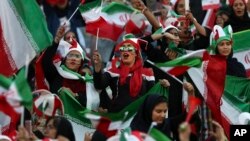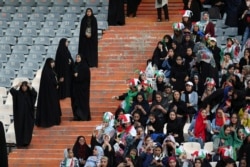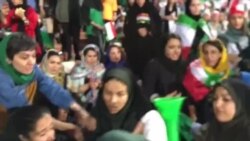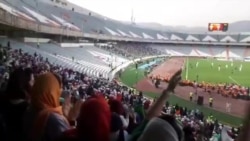This article originated in VOA’s Persian Service. Behrooz Samadbeygi contributed to this report.
Iran has drawn international praise and criticism after allowing thousands of ticket-purchasing women to attend a men’s football match for the first time since the early years of its 1979 Islamic Revolution.
Western news agencies with reporters in Tehran said about 4,000 elated Iranian female fans watched their men’s national team thrash Cambodia 14-0 in a World Cup qualifier in the capital’s Azadi Stadium on Thursday. The women cheered, blew horns, waved flags and donned red, green and white national colors in an upper corner of the stadium that was fenced off to separate them from male fans in the rest of the mostly-empty 80,000 seat arena, in which only several thousand men showed up.
Authorities in Iran had allocated about 4,000 tickets for the female Iranian football fans after facing increasing pressure from football’s world governing body FIFA to end the nation’s decades-old ban on selling tickets to women for men’s matches. Some women who had come to the stadium to try to watch the Cambodia match were stuck outside after authorities refused to make more tickets available.
FIFA had demanded that Iranian women be allowed to buy tickets for Thursday’s match in response to last month’s death of a female Iranian fan who self-immolated after learning that she faced months in prison for being caught disguising herself as a man to enter Azadi Stadium for a men’s club match in March. The death of 29-year-old Sahar Khodayari shocked many Iranians and boosted calls inside and outside the country for the lifting of the stadium ban in memory of Khodayari, whom sympathizers nicknamed “Blue Girl” for her passion for wearing the color of her Tehran team, Esteghlal.
Iran’s ruling Islamist clerics had imposed the ban in the early 1980s to shield women from what they viewed as the unsavory sight of raucous and semi-clad male fans at stadiums for men’s sports such as football.
Iranian state news agency IRNA cited government spokesman Ali Rabiei as saying the attendance of several thousand women at the Cambodia match was a “positive” development.
“The infrastructure of Azadi Stadium is ready for the presence of women,” Rabiei said. “But the cultural and mental infrastructure must be ready,” he added, suggesting that Iran may not be ready to make all future men’s international and domestic football matches accessible to all female Iranian fans.
Last year, Iranian authorities allowed small, select groups of women to attend several men’s matches at Azadi Stadium.
FIFA president Gianni Infantino praised Thursday’s match as a “very positive step forward” for Iran. In a statement, he said FIFA “now looks more than ever towards a future when ALL girls and women wishing to attend football matches in Iran will be free to do so, and in a safe environment. There can be no stopping or turning back now.”
Some human rights activists outside of Iran were less pleased about the images of Iranian women at Azadi Stadium, shared on social media.
Belgium-based women’s rights activist Darya Safai, an Iranian immigrant elected to the Belgian parliament in May, had launched a social media campaign in 2014 to end Iran’s stadium ban on women, using the hashtag #LetIranianWomenEnterTheirStadiums. In a message to VOA Persian, she said the admission of women into Azadi Stadium for the Cambodia match did not mean the stadium ban has been lifted.
“FIFA should not accept only a limited number of women (attending men’s football matches in Iran). Only when all women are free to buy tickets for all football games with no quotas, can we say the stadium ban is lifted and FIFA’s statutes are respected,” Safai said.
Safai also complained about what she described as the “humiliating” nature of some images from Thursday’s match, with female fans being isolated from male fans “in the worst corner of the stadium.”
She also noted that black-clad Iranian policewomen tried to detain a female football fan in the women’s section of the arena. Social media users said the fan had displayed a banner in memory of “Blue Girl” Sahar Khodayari.
A video of the incident sent to VOA Persian and circulated online did not show what the female fan had done before the policewomen tried to detain her. Onlookers shouted at the policewomen to leave her alone.
Another video sent to VOA Persian showed female fans chanting, “It’s a national match, Sahar is missing here.”
“As a member of the Belgian parliament, I’ve been in contact with FIFA on this issue and will continue to monitor it closely,” Safai said.
London-based rights group Amnesty International criticized the limited allocation of tickets for women at Thursday’s match as a “cynical publicity stunt.”
“The Iranian authorities should lift all restrictions on women attending football matches, including domestic league games, across the country,” Amnesty said in a Wednesday statement.














